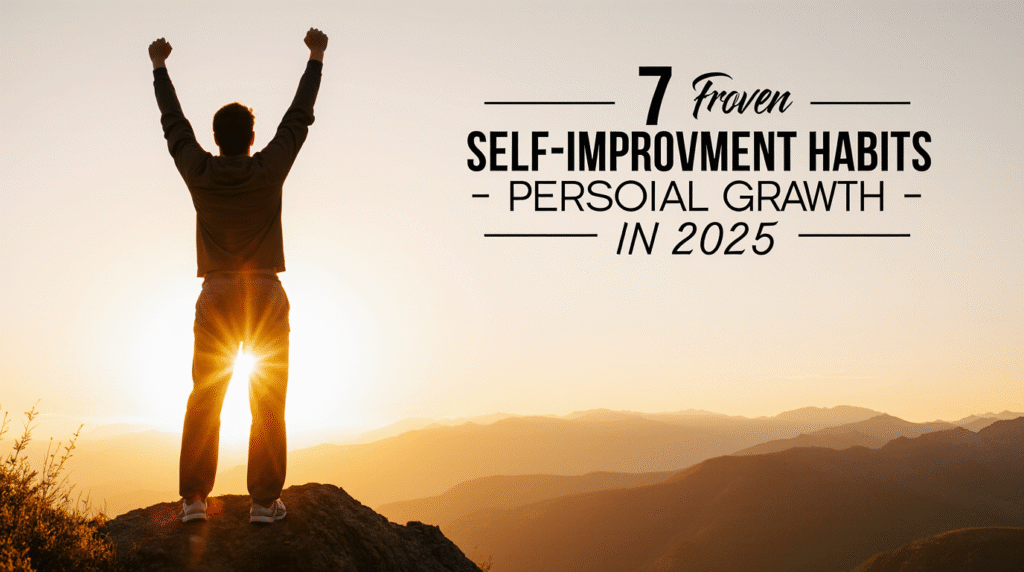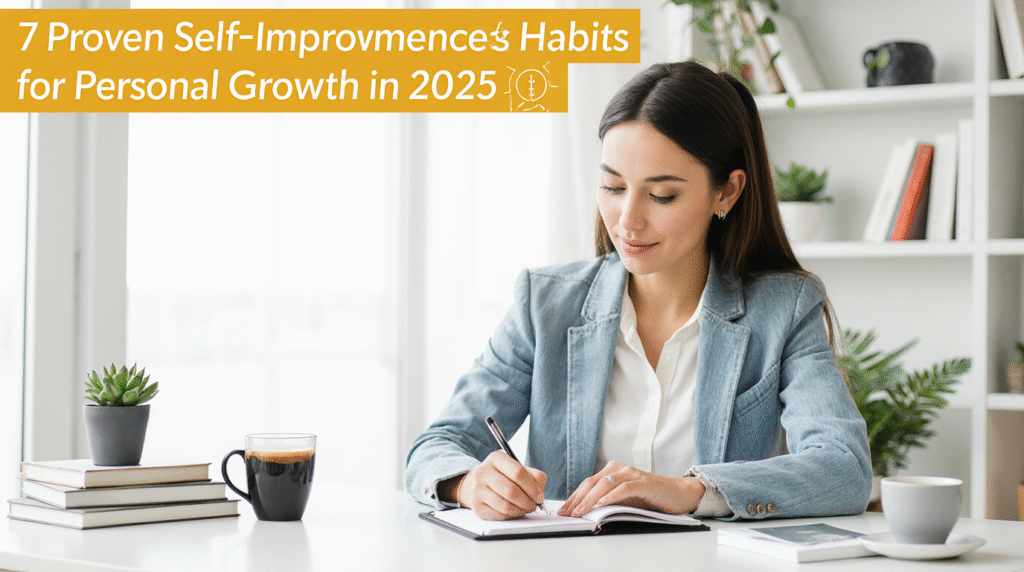7 Proven Self-Improvement Habits for Personal Growth in 2025

Introduction: Your Journey to Personal Growth Starts Here
Are you ready to make 2025 your most transformative year yet? If you’ve been searching for practical self-improvement habits that actually work, you’re in the right place. Personal growth isn’t about overnight miracles—it’s about consistent, intentional actions that compound over time to create extraordinary results.
In this comprehensive guide, you’ll discover seven proven self-improvement habits that successful people swear by. These aren’t just feel-good concepts; they’re backed by science, psychology, and real-world application. By the end of this article, you’ll have a clear roadmap for personal development in 2025, complete with actionable steps you can start implementing today.
Whether you’re looking to boost your productivity, enhance your mental well-being, or accelerate your career growth, these habits for success will give you the foundation you need to thrive. Let’s dive into the strategies that will help you unlock your full potential this year.
Why Self-Improvement Habits Matter More Than Ever in 2025
The landscape of personal development has evolved dramatically. With increasing demands on our time and attention, developing strong self-improvement habits has become essential for maintaining balance and achieving meaningful progress. Research shows that people who actively engage in personal growth activities are 23% more likely to report higher life satisfaction and 31% more productive in their professional lives.
The key lies in choosing habits that align with modern challenges while building on timeless principles of human psychology and motivation.
Habit #1: Morning Mindfulness and Meditation
The Power of Starting Your Day with Intention
One of the most impactful self-improvement habits you can develop is beginning each day with mindfulness and meditation. This practice sets the tone for everything that follows and creates a foundation of calm awareness that carries you through daily challenges.
Why It Works: The Science Behind Morning Meditation
Neuroscience research reveals that meditation literally rewires your brain. Regular meditation practice increases gray matter in areas associated with learning, memory, and emotional regulation while decreasing activity in the amygdala, your brain’s stress center. Studies show that just 10 minutes of daily meditation can reduce stress by up to 40% and improve focus by 14%.
Actionable Tips for Success:
- Start small: Begin with just 5 minutes each morning and gradually increase to 15-20 minutes
- Choose your method: Try guided meditations, breathing exercises, or simple mindfulness practices
- Create a dedicated space: Designate a quiet corner of your home for this practice
- Use apps: Consider meditation apps like Headspace, Calm, or Insight Timer for guidance
- Be consistent: Aim for the same time each morning to build the habit effectively
The beauty of this habit lies in its accessibility—you don’t need special equipment or extensive training to begin experiencing its benefits.

Habit #2: Strategic Goal Setting and Weekly Reviews
Transform Your Dreams into Achievable Milestones
Effective goal setting isn’t about writing down wishes; it’s about creating a systematic approach to personal growth that turns aspirations into reality. This self-improvement habit involves setting clear, measurable objectives and regularly reviewing your progress.
Why It Works: The Psychology of Achievement
Research by Dr. Gail Matthews at Dominican University found that people who write down their goals are 42% more likely to achieve them. The act of writing engages the reticular activating system in your brain, which helps you notice opportunities and resources related to your goals.
Actionable Tips for Success:
- Use the SMART framework: Make goals Specific, Measurable, Achievable, Relevant, and Time-bound
- Break down big goals: Divide annual goals into quarterly, monthly, and weekly targets
- Schedule weekly reviews: Spend 30 minutes each Sunday evaluating progress and planning ahead
- Track your wins: Celebrate small victories to maintain motivation
- Adjust as needed: Be flexible and modify goals based on changing circumstances and new insights
This habit creates a powerful feedback loop that keeps you aligned with your vision while adapting to life’s inevitable changes.

Blueprint to a Better You
Ready to upgrade your mindset, habits, and life? Blueprint to a Better You is your step-by-step guide to breaking old patterns, building healthier routines, and unlocking your full potential.
Get Your Copy NowHabit #3: Daily Learning and Skill Development
Commit to Continuous Growth
In our rapidly changing world, the ability to learn continuously has become one of the most valuable self-improvement habits. Dedicating time each day to acquiring new knowledge or developing skills ensures you stay relevant, engaged, and growing.
Why It Works: The Compound Effect of Daily Learning
The concept of “kaizen,” or continuous improvement, demonstrates that small, consistent efforts compound into significant results. Just 30 minutes of focused learning daily equals 182.5 hours per year—equivalent to a month-long intensive course. This habit also promotes neuroplasticity, keeping your brain flexible and adaptable.
Actionable Tips for Success:
- Choose your medium: Books, podcasts, online courses, or video tutorials—pick what works for your lifestyle
- Focus on one skill at a time: Avoid spreading yourself too thin across multiple subjects
- Apply what you learn: Practice new concepts immediately to reinforce understanding
- Create a learning schedule: Dedicate specific times for learning, such as during commutes or lunch breaks
- Join learning communities: Engage with others who share your interests for accountability and support
Remember, the goal isn’t to become an expert overnight but to maintain forward momentum in your personal development journey.
Habit #4: Physical Exercise and Movement
Fuel Your Mind Through Your Body
Physical exercise isn’t just about looking good—it’s one of the most powerful self-improvement habits for enhancing mental performance, emotional well-being, and overall life satisfaction. Regular movement becomes the foundation that supports all other areas of personal growth.
Why It Works: The Mind-Body Connection
Exercise triggers the release of BDNF (brain-derived neurotrophic factor), often called “Miracle Gro for the brain,” which promotes the growth of new neural connections. Additionally, physical activity increases endorphins, dopamine, and serotonin—your body’s natural mood elevators. Studies show that people who exercise regularly have 25% lower rates of depression and anxiety.
Actionable Tips for Success:
- Find activities you enjoy: Dancing, hiking, swimming, or weightlifting—enjoyment ensures consistency
- Start with 20 minutes: Even brief sessions provide significant mental and physical benefits
- Schedule it like an appointment: Treat exercise as non-negotiable time for yourself
- Mix up your routine: Combine cardio, strength training, and flexibility work for comprehensive benefits
- Track your progress: Use fitness apps or journals to monitor improvements and stay motivated
The key is consistency over intensity—regular moderate exercise beats occasional intense workouts for long-term habit formation.
Habit #5: Building Meaningful Relationships and Networks
Invest in Your Social Capital
Human connections are fundamental to personal growth and life satisfaction. Cultivating meaningful relationships and expanding your network strategically is a crucial self-improvement habit that pays dividends in all areas of life.
Why It Works: The Power of Human Connection
Harvard’s Grant Study, spanning over 80 years, found that good relationships are the strongest predictor of happiness and life satisfaction. Strong social connections not only improve mental health but also boost immune function, increase longevity, and create opportunities for personal and professional growth.
Actionable Tips for Success:
- Practice active listening: Give your full attention when others are speaking
- Reach out regularly: Send thoughtful messages, make phone calls, or schedule meetups
- Attend networking events: Join professional associations, community groups, or hobby clubs
- Be genuinely helpful: Offer assistance without expecting immediate returns
- Nurture existing relationships: Invest time in deepening current friendships and family bonds
- Use technology wisely: Leverage social media to maintain connections but prioritize face-to-face interactions
Remember, networking isn’t about collecting contacts—it’s about building genuine, mutually beneficial relationships.
Habit #6: Regular Self-Reflection and Journaling
Gain Clarity Through Introspection
Self-reflection is the compass that guides personal growth. Regular journaling and introspective practices help you understand your patterns, identify areas for improvement, and maintain alignment with your values and goals.
Why It Works: The Therapeutic Power of Writing
Research by Dr. James Pennebaker shows that expressive writing can improve immune function, reduce stress, and enhance emotional processing. Journaling helps organize thoughts, process emotions, and gain insights that might otherwise remain buried in the subconscious.
Actionable Tips for Success:
- Choose your style: Free-form writing, structured prompts, or bullet journaling—find what resonates
- Set a consistent time: Many find evening reflection or morning pages most effective
- Ask powerful questions: “What did I learn today?” “How did I grow?” “What would I do differently?”
- Review regularly: Look back at past entries to identify patterns and track progress
- Keep it private: Honest self-reflection requires a safe, judgment-free space
- Focus on growth: Use journaling as a tool for learning, not self-criticism
This habit creates a valuable dialogue with yourself, fostering self-awareness and personal insight.
Habit #7: Financial Mindfulness and Planning
Build Your Foundation for Freedom
Financial health directly impacts your ability to pursue other self-improvement goals. Developing mindful money habits and strategic financial planning creates the stability and freedom necessary for personal growth.
Why It Works: The Psychology of Financial Security
Financial stress is one of the leading causes of anxiety and relationship problems. When you have control over your finances, you free up mental energy for other aspects of personal development. Studies show that people with emergency funds report 31% lower stress levels and make better long-term decisions.
Actionable Tips for Success:
- Track your spending: Use apps like Mint or YNAB to understand where your money goes
- Automate savings: Set up automatic transfers to build emergency funds and investment accounts
- Educate yourself: Read books, listen to podcasts, or take courses on personal finance
- Set financial goals: Define clear targets for debt reduction, savings, and investments
- Review regularly: Schedule monthly financial check-ins to assess progress and adjust plans
- Invest in yourself: Allocate money for learning, health, and experiences that contribute to growth
Financial mindfulness isn’t about restricting yourself—it’s about making intentional choices that align with your values and long-term goals.

Creating Your Personal Growth Action Plan for 2025
Now that you understand these seven powerful self-improvement habits, it’s time to create your implementation strategy. Remember, trying to adopt all seven habits simultaneously often leads to overwhelm and failure. Instead, focus on building one habit at a time over 2-3 months before adding the next.
Your 2025 Success Timeline:
- Months 1-2: Establish morning mindfulness and goal setting
- Months 3-4: Add daily learning and exercise routines
- Months 5-6: Focus on relationship building and self-reflection
- Months 7-8: Implement financial planning and mindfulness
This gradual approach allows each habit to become deeply ingrained before adding complexity to your routine.
Overcoming Common Obstacles to Personal Growth
Even with the best intentions, you’ll face challenges in developing these habits for success. Here are strategies to overcome common obstacles:
Time constraints: Start with micro-habits (5 minutes of meditation, reading one page, etc.) Lack of motivation: Connect each habit to your deeper values and long-term vision Perfectionism: Progress over perfection—consistency matters more than intensity Setbacks: View mistakes as learning opportunities, not failures
Remember, personal development in 2025 is a marathon, not a sprint.
Conclusion: Your Transformation Starts Today
These seven self-improvement habits represent more than just daily activities—they’re investments in your future self. Each habit compounds over time, creating a powerful synergy that accelerates your personal growth journey. The science is clear, the strategies are proven, and the only question remaining is: are you ready to commit?
Your best life isn’t waiting for you somewhere in the future—it’s being built through the choices you make today. These habits for success will guide you toward becoming the person you’ve always known you could be.
Start small, stay consistent, and trust the process. Your future self will thank you for the decision you make right now to prioritize your personal growth.
Take Action: Your Next Steps
Ready to transform your life with these powerful self-improvement habits? Here’s what you can do right now:
Subscribe to our newsletter for weekly personal development tips and exclusive content that will keep you motivated on your journey.
Share this article with someone who could benefit from these insights—personal growth is always more powerful when shared with others.
Start today by choosing one habit that resonates most with you and committing to practicing it for the next 30 days.
For more comprehensive guides on personal development, check out our articles on “Building Unshakeable Confidence” and “The Science of Peak Performance.”
Frequently Asked Questions (FAQs)
Q: How long does it take to form a new self-improvement habit? A: Research suggests it takes an average of 66 days to form a new habit, though this varies from 18-254 days depending on the complexity of the behavior and individual factors.
Q: What if I don’t have time for all these habits? A: Start with just one habit and dedicate 10-15 minutes daily. Focus on consistency over quantity—even small actions compound over time.
Q: Which habit should I start with first? A: Morning mindfulness is often recommended as it sets a positive tone for the day and makes other habits easier to maintain.
Q: How do I stay motivated when I don’t see immediate results? A: Track small wins daily and remind yourself that personal growth is a long-term investment. Focus on the process rather than immediate outcomes.
Q: Can these habits work for busy professionals? A: Absolutely! Many of these habits can be integrated into existing routines or practiced during commutes, lunch breaks, or early morning hours.
Q: What’s the biggest mistake people make with self-improvement habits? A: Trying to change too much at once. Focus on building one solid habit before adding another to avoid overwhelm and ensure lasting change.
Q: How do I know if these habits are working for me? A: Keep a simple progress journal tracking your mood, energy levels, and achievements. Look for patterns of improvement over 4-6 weeks.
